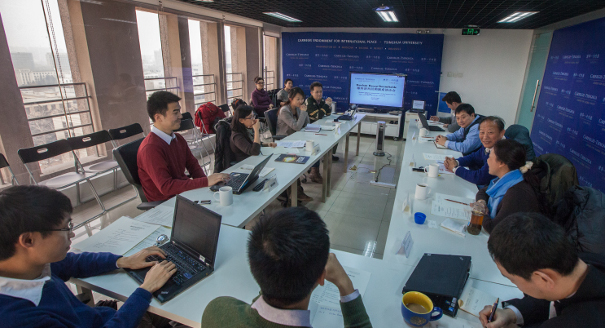Registration
You will receive an email confirming your registration.
IMGXYZ3507IMGZYXA number of important decisions and agreements were reached between parties of UN Framework Convention on Climate Change in Durban, South Africa, including an agreement on a second commitment period for the Kyoto Protocol and the endorsement of a mandate to negotiate a post-2020, legally binding climate change agreement. Carnegie’s Wang Tao brought together a panel of leading Chinese climate change experts in Beijing to discuss the implications of the Durban conference outcomes, especially in regards to China.
Unsolved Issues at Durban
- The Kyoto Protocol: Although Durban saw an agreement on a second commitment period for the Kyoto Protocol, one expert emphasized that the current arrangement for this period is inherently flawed because it is not legally binding.
- Gap Between Commitment and Reality: One expert pointed out a worrisome disconnect between what countries have committed to do to curb climate change, and what must actually be done to address these dangers. This expert added that developed countries in particular must further clarify their mitigation pledges. Another panelist warned that countries should not take the consensus on a mandate to negotiate a new climate change agreement, the Durban Platform for Enhanced Action (DPEA), as another excuse to procrastinate before 2020.
- Transition Between Two Processes: Another discussant added that the previous Bali Action Plan must be concluded properly before beginning the new DPEA agreement.
- Finance Questions: While the Green Climate Fund (GCF) had begun operations by the contention in Durban, one panelist emphasized that the source and scale of capital for the GCF still has not been identified.
Europe’s Leadership at Durban
- Staying on Task: One expert pointed out that in previous negotiations, the EU tried to compromise and find consensus between every cohort. At Durban, however, the EU insisted on sticking to its goals, rather than seeking complete consensus.
- Exceeding Expectations: One expert stated that the EU’s successes are mainly due to leading the international community to start the negotiations for a new international agreement.
- EU Well-Prepared for Negotiations: The EU delegation demonstrated a smart use of background knowledge and negotiation practices at Durban, added another panelist.
"Common but Differentiated Responsibilities"
With the emergence of newly industrialized countries, the shift in global politics and economics is also being seen in climate negotiations. The need for a re-interpretation of the principle of "Common But Differentiated Responsibilities", the cornerstone slogan of UN climate negotiations, played a prominent role at Durban.
- Pressure on Emerging Economies: There is a growing gap between emerging economies, like India and China, and other developing countries in terms of total emissions and economic development, one expert emphasized. BASIC countries are now facing pressure not only from developed countries, but also Alliance of Small Island States (AOSIS) and Least Developed Countries.
- Global South vs North: Despite a reassessment of responsibilities between the previous and most recent round of negotiations, the international power imbalance remains the same between the global north and south, one expert pointed out. Yet the idea of 'Common but Differentiated Responsibilities' has become more difficult to apply in practice, as evidenced by emerging differences among developing countries, the expert added.
- The Focus of Future Negotiation: Another panelist pointed out that the main challenge for emerging economies is to defend the need to emit more for economic development. External pressure from the global media and NGOs will be more intense. In China, especially, stronger evidence is needed to support China’s current stance on carbon emissions and climate change.
Future Strategy of China
The panelists argued that China’s future strategy should entail a number of steps, including:
- Understanding the Demands of Developing Countries: China should represent of the needs of developing countries and initiate more detailed discussions on how to address the nuanced needs of different developing countries.
- Give More Support to the South: Two experts said that China should provide more foreign assistance to less developed nations. In particular, China should offer support in the areas of technology transfer, project management, and capital.
- Cooperation with the European Union: One expert suggested that China should side with the EU, rather than the United State, in future negotiations, given that the EU is more willing than the United States to accept the negotiating principles put forward by developing countries.
- Seek Win-Win Solutions: The fundamental reason why UN climate negotiations have not made substantial progress is that countries only see the costs of mitigation and adaptation, not the benefits, one expert said. A compromise between the shared interests of all parties should be established through opportunities like the re-design of Clean Development Mechanism.
The Role of Chinese NGOs
- Increase Awareness of China’s Limitations: One expert believes that the role of Chinese NGOs during the negotiation was to adjust and control the expectations of the domestic audience. Chinese NGOs need a deeper understanding of the practical limitations that China faces at the negotiating table in order to properly manage expectations on the home front. This can only be achieved through the encouraging more practical experience. Another panelist pointed out that Chinese NGOs need to clearly understand the political situation in order to be able to play a more significant role at the negotiating table.
- Uphold Independence and Impartiality: Throughout negotiations, Chinese NGOs should remain objective or risk losing their credibility, said one panelist. Another expert added that environmental NGOs should only promote sustainable development rather than espouse certain political slants.
